WASHINGTON, D.C. -- Hawaii had the highest well-being among states in 2010 with a Well-Being Index score of 71.0. Wyoming, North Dakota, and Alaska are also among the 10 states with the highest overall well-being scores. West Virginia had the lowest well-being with a score of 61.7. The Southern states of Kentucky, Mississippi, Arkansas, and Alabama round out the states with the five lowest well-being scores.
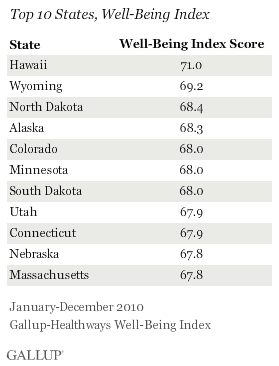
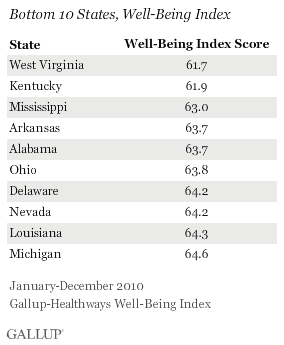
These state-level data are based on daily surveys conducted from January through December 2010. The Gallup-Healthways Well-Being Index is calculated on a scale of 0 to 100, where a score of 100 represents ideal well-being. Well-Being Index scores among states vary by a narrow range of 9.3 points. The Well-Being Index score for the nation was 66.8 in 2010.
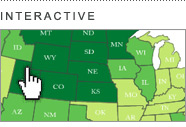 |
| Explore complete state data > |
Most Southern States Have Low Well-Being
Ten Southern states have a Well-Being Index score that puts them in the lower range well-being group. There are also more states in the South with well-being scores in the lower range than there are throughout the rest of the country. Nevada, which is influenced by the poor well-being score in Las Vegas, is the only Western state with a lower range well-being score.
Many Western states, in contrast, shine in well-being, with 5 of the top 10 -- Hawaii, Wyoming, Alaska, Colorado, and Utah -- located in that region of the country.
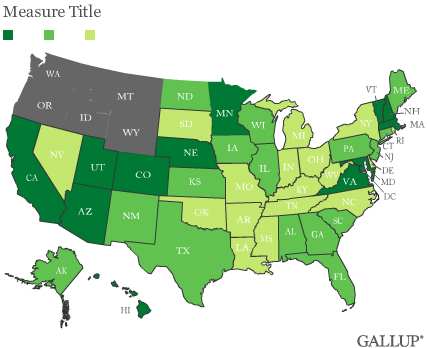
Sub-Index Standouts and Sluggards
Hawaii placed first in well-being in part by being the best performing state on three of the six sub-indexes that make up the Well-Being Index: Life Evaluation, Emotional Health, and Physical Health. West Virginia took last place in well-being because of the opposite: The state was the worst performing on the same three sub-indexes.
Delaware residents continue to report the worst work environments in the country, while those living in South Dakota are the most positive about their work situations.
Vermont still boasts the best overall health habits in America, and Kentucky continues to have the worst. Massachusetts residents have the best access to necessities crucial to high well-being, while Mississippi residents again have the worst, with a score on this index even lower than it was in 2009.
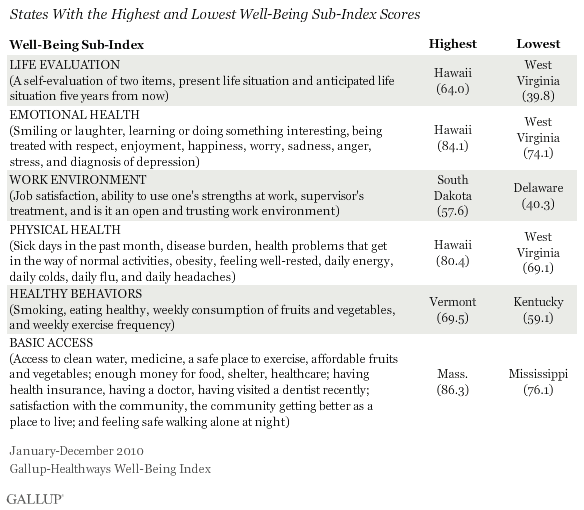
Bottom Line
Improving well-being scores will be a challenge for leaders as many states have been facing and continue to encounter significant fiscal problems, including having to close public schools, lay off or cut salaries of public workers, and cut back on public services -- all of which have the potential to affect different aspects of well-being.
Although money is tight, finding ways to increase residents' access to good jobs and to basic necessities -- including medical care in particular -- and decrease costly, chronic conditions such as obesity and diabetes will be the most likely means to improve well-being. At a time when state and local governments are challenged with being able to provide basic services, business leaders may be able to step in and play an important role in increasing well-being in their communities, which is good for business, as higher well-being means lower healthcare costs and greater economic growth.
Gallup's "State of the States" series reveals state-by-state differences on political, economic, and well-being measures Gallup tracks each day.
About the Gallup-Healthways Well-Being Index
The Gallup-Healthways Well-Being Index tracks U.S. well-being and provides best-in-class solutions for a healthier world. To learn more, please visit well-beingindex.com.
Survey Methods
Results are based on telephone interviews conducted as part of the Gallup-Healthways Well-Being Index survey Jan. 2-Dec. 29, 2010, with a random sample of 352,840 adults, aged 18 and older, living in all 50 U.S. states and the District of Columbia, selected using random-digit-dial sampling.
For results based on the total sample of national adults, one can say with 95% confidence that the maximum margin of sampling error is ±1 percentage point.
The margin of sampling error for most states is ±1 to ±2 percentage points, but is as high as ±4 points for states with smaller population sizes such as Wyoming, North Dakota, South Dakota, Delaware, and Hawaii.
The Gallup-Healthways Well-Being Index categorizes the District of Columbia as a congressional district.
Interviews are conducted with respondents on landline telephones and cellular phones, with interviews conducted in Spanish for respondents who are primarily Spanish-speaking. Each daily sample includes a minimum quota of 200 cell phone respondents and 800 landline respondents, with additional minimum quotas among landline respondents for gender within region. Landline respondents are chosen at random within each household on the basis of which member had the most recent birthday.
Samples are weighted by gender, age, race, Hispanic ethnicity, education, region, adults in the household, cell phone-only status, cell phone-mostly status, and phone lines. Demographic weighting targets are based on the March 2010 Current Population Survey figures for the aged 18 and older non-institutionalized population living in U.S. telephone households. All reported margins of sampling error include the computed design effects for weighting and sample design.
In addition to sampling error, question wording and practical difficulties in conducting surveys can introduce error or bias into the findings of public opinion polls.
For more details on Gallup's polling methodology, visit https://www.gallup.com/.
